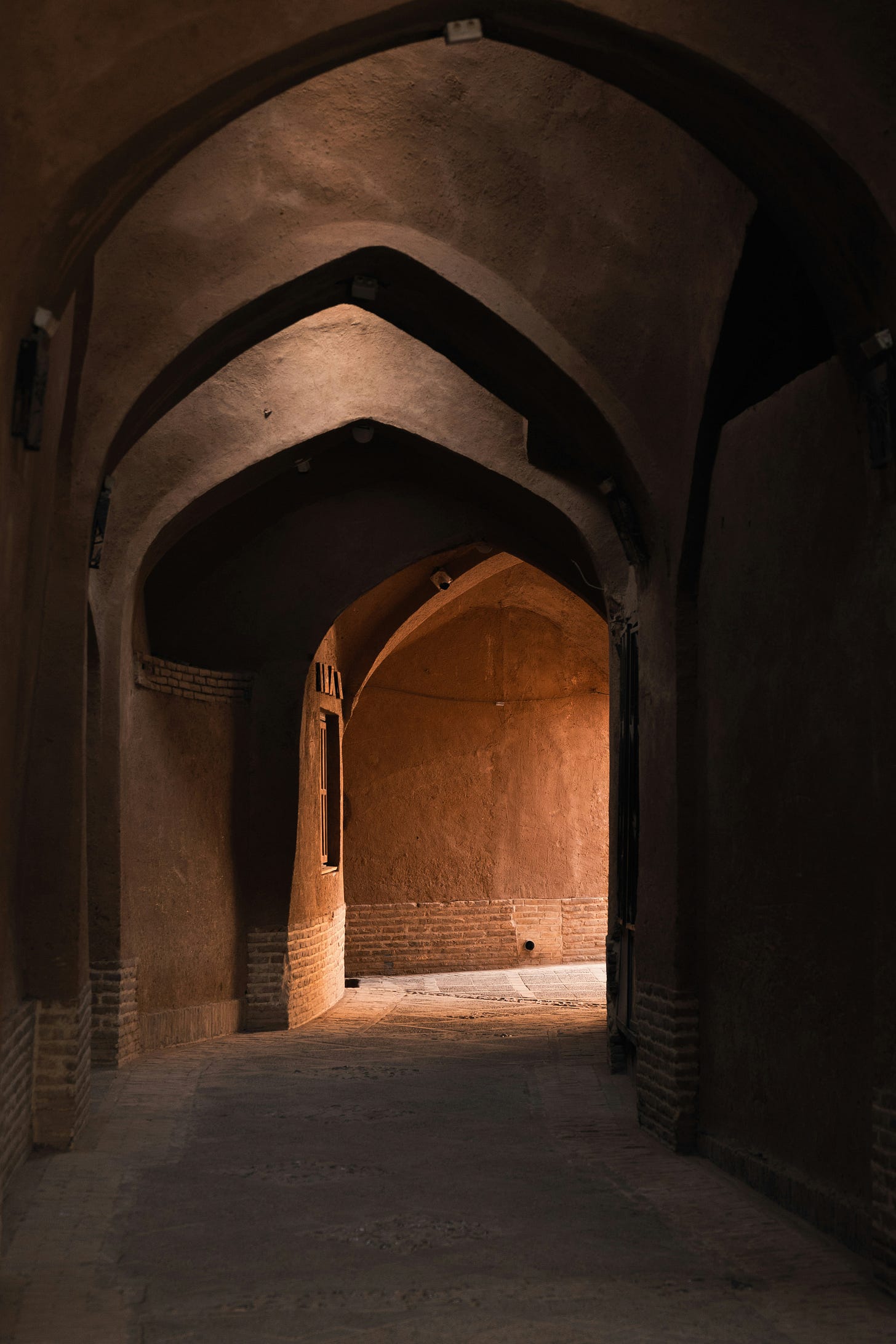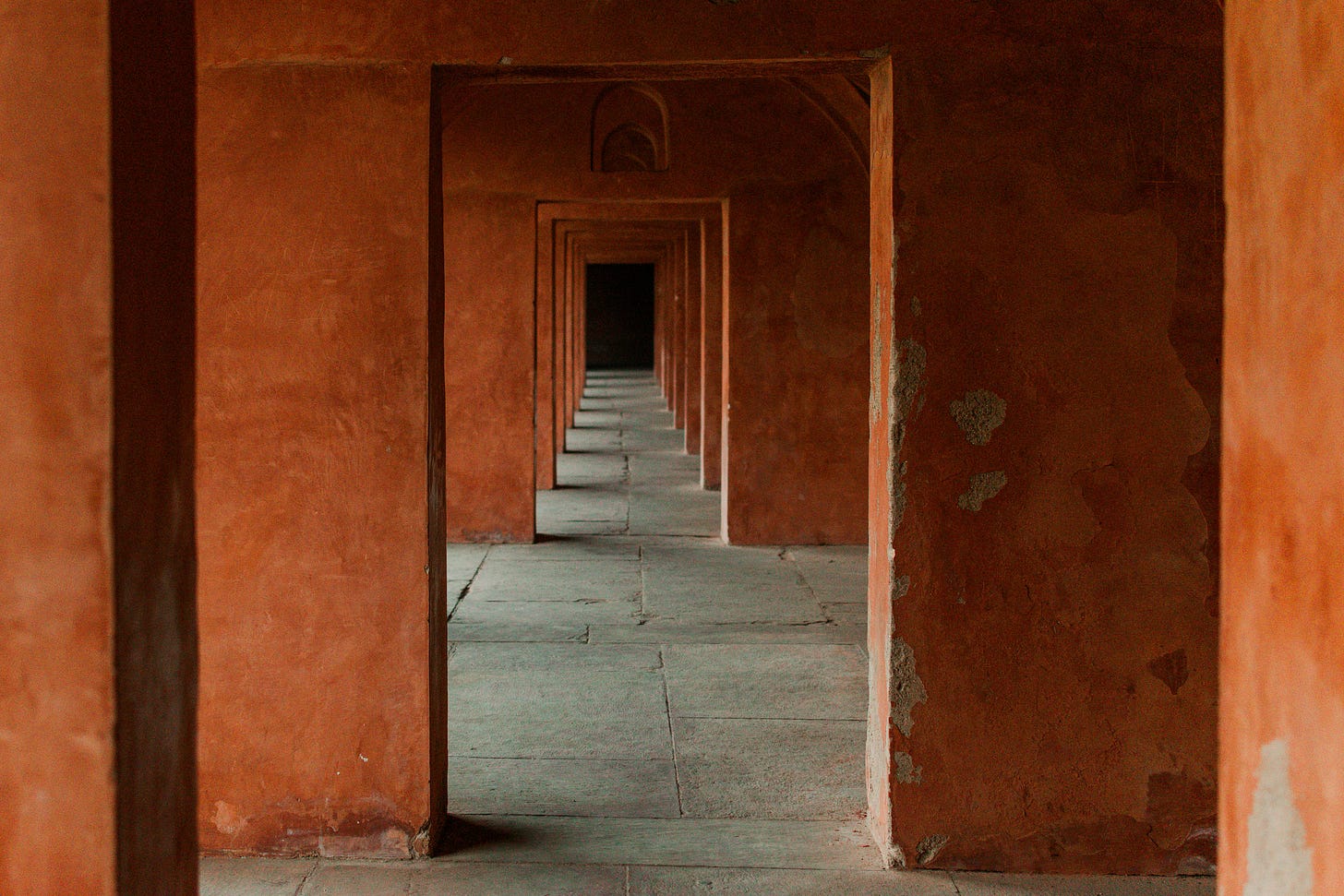LIVING LIMINALLY - Part 1
Learning to navigate life's transitions
“In the universe, there are things that are known, and things that are unknown, and in between them, there are doors.” ~ William Blake
When asked recently to describe this particular season of my life, I said, “I feel as if I am stuck in a prolonged liminal space.” The person I was speaking to laughed and said, “Aren’t we all?”
In a broad sense, liminality could indeed describe the experience each of us has between birth and death. It could also describe the sense of limbo felt while enduring numerous angst-ridden situations characteristic of these vitriolic times. But as applicable as those views might be, I specifically want to address the power and potential of consciously navigating liminal space during significant life transitions.
To begin with, the word liminal comes from the Latin term limina, meaning threshold – an in-between space where you are neither in one room nor another. To live liminally (or in liminality) means to exist for a time somewhere between the world you once understood and one that is still emerging.
Many life events can throw us into such a season – like losing a job or loved one, experiencing illness or disability, making a significant move, or the dissolution of deeply held beliefs. When such events happen, we often find ourselves trying to stand with one foot in our familiar reality while tentatively stepping into an unknown and often disruptive new one. Although uncomfortable, these liminal spaces can be opportunities for genuine transformation and growth.
Franciscan priest Fr. Richard Rohr, author of numerous books on spirituality and founder of The Center for Action and Contemplation (cac.org), has this to say about liminal space.
“…we have to allow ourselves to be drawn into sacred space, into liminality. All transformation takes place here. We have to allow ourselves to be drawn out of "business as usual" and remain patiently on the "threshold" … where we are betwixt and between the familiar and the completely unknown. There alone is our old world left behind, while we are not yet sure of the new existence… It's the realm where God can best get at us because our false certitudes are finally out of the way. This is the sacred space where the old world is able to fall apart, and a bigger world is revealed.” ( https://cac.org/daily-meditations/liminal-space-2016-07-07/ )
For the past eight years, I feel like I have been crossing one threshold after another, sometimes eagerly and often reluctantly. This particular season of life has brought the release of many material possessions through radical downsizing, several disruptive moves, my husband’s deteriorating health, and my own attempts to come to terms with the aging process. (And, oh yes, let’s not forget the two-year liminal space of the Covid pandemic we all experienced a few years back!) Additionally and simultaneously, I have undergone a significant deconstruction and reconstruction of my spiritual beliefs.
Regardless of the type of transition, my experience has been that just when I think I understand who I am and what I’m doing, some unexpected event or new insight challenges my certainty, and I know I’m not finished yet. My sense of self is still betwixt and between, straddling a threshold between the old me and the one that is emerging. I often feel like I am flying blind and have no idea which way is up!
However, I've learned several things about living liminally while navigating these changes. The first and most important is: my resistance to change causes unnecessary suffering. Think Jonah in the belly of the whale. Although Jonah ultimately did what God asked him to do, he barely survived to tell the tale. Sometimes we know where we are being called; we just don’t want to go there. These days, I find it best to go with the flow rather than try to dam Niagara Falls. Although that feeling of going over the falls is certainly uncomfortable, it is also sometimes inevitable.
I now know that when I soften my stance and trust in the process (also known as surrendering), I feel less stressed and am more receptive to Inner Wisdom and guidance. In this less resistant state, I am able to receive direction or gain interesting insights into my current situation. Creative solutions to problems often arise unexpectedly, and at times, I’m able to experience a surprising amount of peace in the midst of chaos.
“Dwelling in unsettling liminal space, whether we are pushed or we jump, we are led to draw on resources and possibilities we may not have tapped before.” ~ Sheryl Fullerton
So why is it important to recognize and acknowledge liminal seasons of life? Because liminal space is a crucible of the sacred. Understanding the uncertainty experienced in these intervals as the Holy at work in your life can help you stay the course when you feel like throwing in the towel. It can give you the tenacity to wait patiently until transformation occurs and you cross the threshold, where a new understanding of life awaits. To ignore or refuse to consciously participate in the process is to miss the opportunity for growth, and life will likely present you with another similar challenge down the road.
I love these words of wisdom from John O’Donohue, the Irish priest, poet, author, and mystic, regarding threshold crossing from his book, To Bless the Space Between Us:
At any time you can ask yourself: At which threshold am I now standing? At this time in my life, what am I leaving? Where am I about to enter? What is preventing me from crossing my next threshold? What gift would enable me to do it? A threshold is not a simple boundary; it is a frontier that divides two different territories, rhythms, and atmospheres. Indeed, it is a lovely testimony to the fullness and integrity of an experience or a stage of life that it intensifies toward the end into a real frontier that cannot be crossed without the heart being passionately engaged and woken up. At this threshold, a great complexity of emotion comes alive: confusion, fear, excitement, sadness, hope. This is one of the reasons such vital crossings were always clothed in ritual. It is wise in your own life to be able to recognize and acknowledge the key thresholds: to take your time; to feel all the varieties of presence that accrue there; to listen inward with complete attention until you hear the inner voice calling you forward. The time has come to cross.
As O’Donohue intimates, liminal space is a time for patience, but it is not passive. It is an interval of deep feelings, inner inquiry, and reflection. What we ‘do’ during this time matters. Transformation requires our active attention and intention. We may not direct the unfolding of outer circumstances, but we must actively participate in the process.
I have found the following strategies helpful while navigating my own periods of liminality. Although they may not entirely eliminate the discomfort accompanying a particular transition, they might help to regulate the nervous system in times of distress and allow your Inner Wisdom to provide clarity about your situation.
Be present as much as possible—don’t dwell on the past or worry about the future. Place your attention on the here and now.
Take time to ground yourself—be in your body. Try yoga or some other mindful movement, stand barefoot on the grass, take three conscious deep breaths, or connect with your senses (notice what you are seeing, feeling, hearing, smelling, and tasting in the present moment).
Allow yourself to rest and relax when you need to. Listen to your body, but
Try not to numb out with TV, social media, alcohol, food, etc.
To the best of your ability, feel your feelings.
Take time to connect with your Inner Wisdom: meditate, pray, journal, dance, or drum.
Be creative in ways that nourish your soul – paint, collage, write, sculpt, dance, sing, make music, or build something.
Pay attention to meaningful coincidences (synchronicities) and dreams. They are often your inner guidance showing you the next step.
Find other like-minded people to connect with.
Find a spiritual director or counselor – someone who has successfully navigated the murky waters of liminal space. Optimally, this is a person who can hold space for you without judgment while you process your experiences.
I will also add that while all of these strategies help, there is still an element of discomfort inherent when traversing liminal space. If there weren’t, nothing would change; we would not change. And so we wait patiently for the sacred transformation occurring within us to run its course and guide us over the threshold to the person we will be on the other side.
No one describes this disquieting numinous space better than T. S. Eliot in East Coker, the second poem of his Four Quartets:
I said to my soul, be still, and wait without hope
For hope would be hope for the wrong thing; wait without love,
For love would be love of the wrong thing; there is yet faith
But the faith and the love and the hope are all in the waiting.
Wait without thought, for you are not ready for thought:
So the darkness shall be the light, and the stillness the dancing.
I wonder: When have you experienced a sense of liminality? What were the circumstances? How did you navigate through a transition that made you feel uncertain? What strategies helped?
I’d love to hear from you, so please do leave a comment!
Next week, I will share some thoughts about living liminally through collective transitions.
If you enjoy the content here, please share this post and invite friends who might be interested to subscribe.
Peace on the journey,
Donna
“We must be willing to let go of the life we have planned so as to accept the life that is waiting for us.” ~ Joseph Campbell






I feel I have been living in this space for quite a while now. Besides all the wonderful suggestions you gave, which I do most of them, the one thing I would add is to be kind to yourself. I recently had a guilt trip come upon me about some decisions I made last year, that I wish I would have made differently, and if those situations came up now, I would. I am a different person than last year, I've grown, become softer, understandings have come my way. I did the best I could at the time, but I still have some regrets. So I let me feel that for awhile, just so it could have its say, and then I allowed it, released it, thanked it for its lesson, which for me, is maybe next time a situation like that comes up, instead of just rushing in "to get it done", take a sacred pause, allow wisdom to share her words, relax.